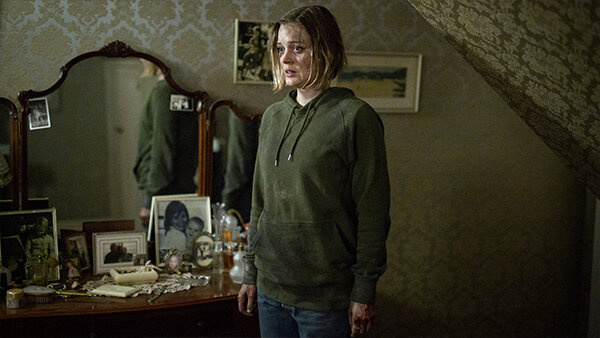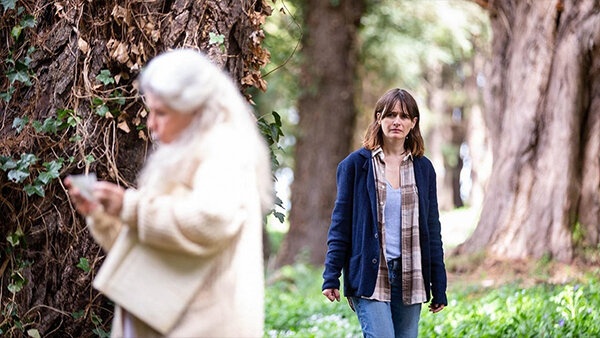Examining trauma and loyalty that binds three generations of women in one family, Natalie Erika James’ debut film Relic uses horror as a tool to excavate the deepest fears we have for one another. But it’s also laced with love: Sophie Butcher reflects on the parts of her own family, her guilt, her grandmother, that such a piercing film brought to the surface.
Earlier this year, my grandmother had a stroke. A big one. My tiny, fiery, handbag-loving, liquorice-eating, lovingly infuriating grandma fell from her chair one morning, as a blood clot entered her brain and changed our lives forever.
She’s recovered enormously well, but it’s affected a lot of things. Her speech sounds different, her mobility isn’t as great as it was, she is tired all the time, and, as she often tells us, she “isn’t herself any more”. To grow old is, it seems, to grow steadily further away from the person you once were. In the case of Edna, the elderly matriarch in Natalie Erika James’ Relic, the catalyst for this separation of self is dementia -– or at least, a monstrous interpretation of it.
Relic’s first act sees Edna reported missing by a neighbour, with her daughter Kay and granddaughter Sam travelling to her home to search for her. Three generations of women come together in the film, just as they did in my family – in the aftermath of her stroke, myself, my mother and aunty spent more time with my grandma and each other than we ever have in our lives, as we tried to help the person who had raised and cared for all of us pick up the pieces of herself and put them back together again.
This environment becomes a breeding ground for both tension and tenderness: for your loved one, relinquishing independence isn’t easy, and for you, making decisions that maintain your sanity as well as their dignity is tough. In Relic, Sam and Kay disagree about whether Edna should be put in a care home. Sam asks, “Isn’t that how it works? Your mum changes your nappies, and then you change hers?”. She suggests Edna should move in with Kay, who instantly rejects the idea. “It’s not practical,” she responds, “She needs to be watched”. This may be true, but when it comes to looking after our older family members, it can often feel like you want them to be cared for, but you don’t want to be the one to do it. You want their mouths to be wiped and bodies to be cleaned and medication to be taken, but, though it feels terrible to admit, you don’t want to be holding the towel or counting out pills.
Immediately after my grandma’s stroke, thanks largely to proximity and availability, the majority of her care fell to me. I’m proud of how I stepped up: I helped her get washed, cooked her food before cutting it into tiny, manageable pieces, and held the bowl when she couldn’t keep it down. I tucked her in at night. I literally bore the weight of her when she struggled to get up and down the stairs. I did all of this out of love, and I surprised myself with how naturally it came. Like Sam, who offers to move in with Edna, I was committed to my role of ‘model granddaughter’. Sometimes I wonder if looking the part was a bigger motivation for me than my grandma’s actual needs, and I feel guilty. And then I hear her voice, telling me repeatedly how this is all too much, and I should be out living my own life, and my guilt eats itself.
Edna soon returns, and later tells Kay that her large, rural house feels “unfamiliar”. The level of Edna’s disorientation is emphasised by glances of post-it notes dotted throughout the rooms, which remind her of things like what her name is, and to turn the taps off. The house becomes an increasingly unsettling place as the film goes on: dark stains and near-constant creaking noises give the sense that the house is groaning and decaying with despair, and the circular stained glass window in the front door that features in Kay’s nightmares is like an ominous portal to the past.
In the final act, the house tries to consume the characters completely. Sam enters a dark closet adorned with scratch marks, and she becomes lost in a maze of hallways that she can’t escape. Like Alice in Wonderland, the walls close in around her, doorways become smaller and there are shifts in gravity. It’s not unusual for horror movies to take place in one big, spooky location, but this allegorical use of the home itself as an antagonist is also a reflection of the confines of old age, and how it feels to care for someone. Seemingly overnight, my world shrank vastly from one filled with work, friends and creative endeavours, to a matter of getting through 24 hours, one minute at a time. My grandma’s exceptionally clean, magnolia-tinted home became my entire universe; memories of her cooking a Sunday roast or taking her cardigan off to do the ironing were pushed aside to make room for those of myself in her place, fumbling to boil some potatoes, or folding freshly pressed shirts much more haphazardly than she would.
As Sam becomes trapped in the walls, Relic’s slow descent into the surreal gathers pace. Edna goes for a bath, but Kay notices water flooding out from under the door. Edna’s bare shoulders reveal dark, black holes in her skin, as though it’s melting away. She scrapes and stabs at it, desperate to shed her flesh. A horrifying chase ensues - Edna morphs into a warped, demonic version of herself, and pursues both Sam and Kay throughout the labyrinthian walls of the house.
“It’s not her any more!”, Kay yells, as Sam is horrified by the shadow of her grandmother crawling towards her. They hammer their way through the chimney breast to freedom, but the thing that used to be Edna follows them. Kay manages to hit her over the head, allowing herself and Sam to leave – but at the door, staring at that stained glass landscape, she changes her mind. Quietly, she utters “I can’t leave her”. The tone shifts in seconds, as we go from fearing Edna’s shrunken, grotesque form to pitying it, with a shot of Kay carrying her mother upstairs like a baby instantly diffusing the climactic dread that had built up just moments earlier.
As Kay sets Edna down on the bed and begins to gently and carefully peel away the scraps of her skin that remain, I went from covering my eyes in terror to wiping tears from them, which soon turned into body-shaking sobs. In near-silence, Kay strips her mother of her soft, fleshy shell to reveal a black, skeletal form underneath. This physical transformation of Edna into something that she and her family can barely recognise, but still care for, felt to me like a devastatingly true representation of what it’s like to watch the cruel inevitability of entropy wreak havoc on the bodies and minds of those who raised you.
Relic ends quietly and tenderly, as Edna, Kay and Sam all lay down beside each other on the bed; three generations united in a moment of stillness. Sam spots a small dark patch on the back of Kay’s neck, and we are reminded that this is not the end – the circles of life and death march on. Edna isn’t herself anymore, and neither is my grandma. But, like the post-it note that we glimpse as Kay returns to her mother’s blackened body says: they are loved. No matter who, or what, they become.
Sophie Butcher (@sophiefbutcher) is a freelance writer living in the North East of England. You can find her work in EMPIRE, Huff Post UK and more, or subscribe to her newsletter, ‘Growing Pains’.



